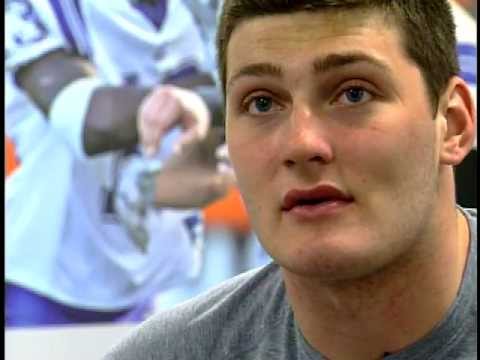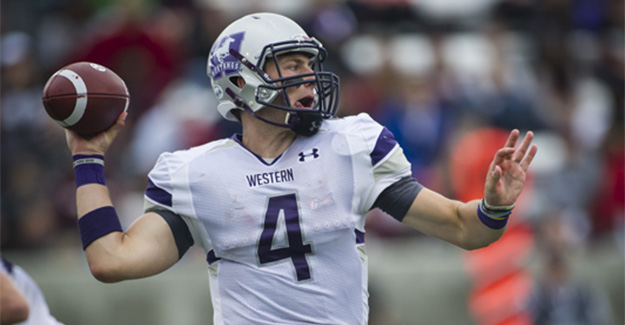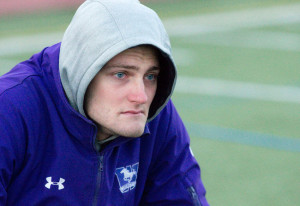January 25, 2016
BURLINGTON, ON
Burlington’s Will Finch, the record-setting, fourth-year quarterback of the University of Western Ontario Mustangs is calling it a career.

Will Finch – A Nelson High graduate who went on to Western where he broke most of the existing records.
Finch was one of the Canada’s most highly sought after recruits when he graduated from Nelson High School in 2012. He led the Lords to an undefeated 12-0 season, and the Golden Horseshoe Bowl title in 2011.
One of London’s best known athletes, one whose concussions have sidelined him before, is retiring to avoid risking further injury. Each of his last three seasons has been interrupted by injury. He missed the end of the 2014 and 2015 Ontario University Association seasons because of concussions.
The awareness of the impact of brain injuries on athletes at all levels has grown dramatically in recent years, underscored by the 2015 Hollywood movie “Concussion.” The film is about Dr. Bennet Omalu, a pathologist, who uncovered the truth about brain injuries among players in the National Football League.
In Canada, Leo Ezerins, Executive Director of the Canadian Football League Alumni Association, and Toronto Rehab and Toronto Western Hospital have been at the forefront of research into brain injuries for the past seven years.
and Toronto Western Hospital have been at the forefront of research into brain injuries for the past seven years.
Caused by blows to the head or violent hits to the upper body, common in contact sports, the effects of concussions are usually temporary, but can range from headaches and problems concentrating, to memory and balance problems.
In London, medical professionals have been on the cutting edge of concussion research and treatment. The Fowler Kennedy Sport Medicine Clinic, founded in 1974, has had more than 2,000 visits by hockey, soccer, basketball and football players with sports concussions.
Dr. Henry Svec, a psychologist who operates the Dr. Svec Institute and Rehabilitation Clinics in several cities in Southwestern Ontario, and a former Mustang football player who deals with traumatic brain injuries, called Finch’s decision, speaking as a fan and alumni, a “courageous one.”
But Svec said too often not enough is done to diagnose the severity of a concussion and not enough recovery time is allocated for the brain to heal and rehabilitate after an injury.
In his four years at Western, Finch played 30 regular-season games — completing 533 of 790 passes for 8,243 yards, 57 touchdowns and 24 interceptions. He also had more than 1,200 yards rushing. In six playoff games, he had 1,372 yards passing.
— completing 533 of 790 passes for 8,243 yards, 57 touchdowns and 24 interceptions. He also had more than 1,200 yards rushing. In six playoff games, he had 1,372 yards passing.
His best season was 2013-14 when he played in all eight regular-season games and three playoff games. In the regular season, he completed 191 of 274 passes for 3,047 yards and 21 touchdowns, with six interceptions.
In the playoffs he completed 48 of 78 passes for 576 yards and three touchdowns. He set an Ontario University Athletics record with 3,047 passing yards, and a 69.7 completion percentage. He was the 2013 OUA most valuable player and Hec Crighton Trophy nominee.


















